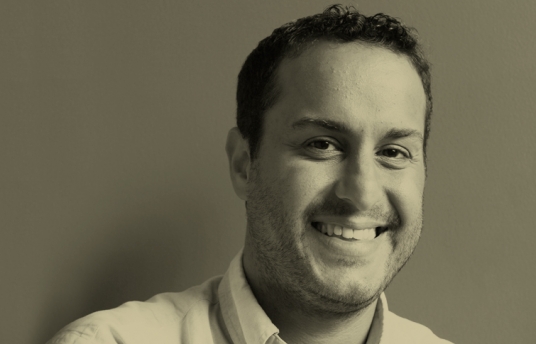أهل السينما: مهدي فليفل
26 يونيو 2013

يكتسح فيلم “عالم ليس لنا” – اطلعوا على رأينا بالفيلم هنا – المهرجانات السينمائية حول العالم، منذ فترة، ويحقق نجاحاً تلو نجاح. التقينا بمخرجه مهدي فليفل في باريس ودار بيننا الحوار التالي:
مؤسسة الدوحة للأفلام: لقد لجأتَ لاستخدام الكثير من المشاهد التي كان قد صوّرها والدك، بالاضافة إلى مذكراتك الخاصة المصوّرة، لصناعة فيلم “عالم ليس لنا”. كيف تصف لنا عملية تبلور قصة مشروعك؟
مهدي فليفل: شعرت أني أقوم بنحت منحوتة بدلاً من الكتابة. كانت تتوفر لدي 150 ساعة من المشاهد المأرشفة، بالاضافة للكثير من الذكريات، لذلك كان الأمر يشبه تماماً قطعة كبيرة من الحجارة التي عليّ نحتها. بالاضافة إلى أن التعاون بيني وبين المونتير مايكل أغلوند كان وثيقاً. أثق بذوقه وموهبته، فهو فهم ما أريد قوله منذ اللحظة الأولى.
مؤسسة الدوحة للأفلام: كم تطلب مشروعك وقتاً للانتهاء؟
فليفل: في النهاية لم نعد نهتم بمسألة الوقت. ربما بدأت في نوفمبر من العام 2010، وحين انتهينا كنا قد أصبحنا في أغسطس أو سبتمبر من العام 2012. باستطاعتي أن أجزم أنه تطلّب عاميْن. كنا قد تخرّجنا لتونا وكنا بحاجة للعمل على مشروع يثبت وجودنا وانطلاقتنا. توفّرت لدي كل تلك المواد، بالاضافة إلى الوقت. كنا نأخذ أوقات راحة كثيرة لكي تبقى الرؤية لدينا واضحة. كان مايكل في هذه الأثناء يعمل على مشاريع أخرى، وأنا أمارس التعليم أو أقوم بإكمال كتابة الفيلم. الرائع أننا لم نكن مقيدين بوقت ومواعيد تسليم.
مؤسسة الدوحة للأفلام: صوتك في التعليق على الفيلم ناعم ورقيق جداً، وأحياناً يشعرنا بأنك تكتشف المخيّم للمرة الأولى ومكانك فيه. إنه طابع خاص جداً. كيف قمت بهذا الخيار؟
فليفل: أظن أن ذلك محض غريزة. هذا الطابع مطعّم بكل ما نشأت عليه في محيطي. لطالما أحببت التعليق الصوتي المرافق للمشاهد في الأفلام، لأنها بالنسبة إلي تمثّل الراوي الذي يرشدنا إلى الاحداثيات في هذا العالم. كانت تلك قصتي، فأردت أن أخبرنا بصوتي.
مؤسسة الدوحة للأفلام: كان بإمكانك أن توجه فيلم “عالم ليس لنا” في ناحية سياسية، لكنك لم تفعل. وتلك استراتيجية سينمائية ذكية جداً. كيف توصلت لفعل ذلك؟
فليفل: لم أشعر أن تحويره سياسياً سيكون الصواب، لأنه سيتعارض وتجربتي في مخيّم عين الحلوة. معظم الأفلام الوثائقية عن فلسطين تنتهي بالمشاهد ذاتها، كأشجار الزيتون المحترقة، وصوت المعلّق الدرامي وموسيقى العود. تكرّر ذلك كثيراً، بطريقة أصبحت مألوفة جداً. كأن نرى صور الأولاد الذين يرشقون الحجارة على الاسرائيليين، والدبابات والعتاد الاسرائيلي. لم أشهد كل تلك الأمور في طفولتي. لم أعش يوماً في ظل الاحتلال. كان أهلي لاجئين في لبنان. العنصرية تعرّضنا لها على يد إخواننا العرب. الحواجز العسكرية التي أوقفنا عليها كانت حواجز لبنانية. لذلك تجربتي كفلسطيني مختلفة تماماً عن تجربة الفلسطيني التي اعتدنا مشاهدتها على التلفزيون. وأنا أردت إبراز ذلك.
مؤسسة الدوحة للأفلام: لاحظنا أنك دائماً خلف الكاميرا في فيلم “عالم ليس لنا” ولا تظهر أمامها أبداً إلا في مشاهد طفولتك. ما السبب؟
فليفل: كانت لدي أدوار صغيرة على مدار الفيلم، لكني سعيد بأن لا أحد لاحظها. ظهرت في بعض المشاهد حيث أقوم بتثبيت الكاميرا ثم التفاعل معها، أي أكون جزءاً من المشهد الذي يظهر فيه جدي. إني متأثر بأسلوب روس ماكيلوي. لكن أثناء المونتاج لم أشعر أنه الأمر الصواب. أردت أن أصنع فيلماً عن الناس الذين أصوّرهم، ليس عني. ماكيلوي يحسن فعل ذلك لأنه يجرّد نفسه تماماً من الغرور.
مؤسسة الدوحة للأفلام: أحد المشاهد القوية جداً في الفيلم، حين تذهب في رحلة مدرسية إلى إسرائيل. في هذه اللحظة أنت تنظر إلى الخلف وكأنك أدركت موقعك الخاطئ للمرة الأولى.
فليفل: التجربة هذه كانت شديدة التعقيد كي أفهمها. كنت في الـ 17 وكانت تملأ رأسي كل تلك الأفكار عن فلسطين الأرض المنهوبة. لكني وجدت نفسي أقف على أرضها كزائر غريب. لم أعرف كيف أشعر بالرابط بيني وبينها. ذهبنا إلى متحف المحرقة اليهودية، وكانت الشموع تملأ المكان وصوت هادئ يردد أسماء الضحايا. خرجنا وكان الجميع إما مزعوجاً أو باكياً. وقفت هناك وفكرت: ما خطبي؟ لماذا أنا لا أبكي؟
لكني فهمت أمراً واحداً، وهو أني تلقيت تربيةً مختلفة عن زملائي في المدرسة. لقد عشت السنين التسع الأولى في عالم كانت قصصه مختلفة بعض الشيء. لذلك كان الوقوف في هذا المكان غريب قليلاً، لأني في ضيافة من سرقوا أرض أجدادي، كما قيل لي مراراً وتكراراً.
مؤسسة الدوحة للأفلام: هناك مشهد مؤثر آخر لجدك حين يعود إلى المنزل من زيارة الطبيب. إنه مرهق ومنزعج ويريد البقاء وحده. يا له من مشهد حميم بل ومبالغ في الحميمية أيضاً. لماذا وضعت هذا المشهد في الفيلم؟
فليفل: لا أظن أني تمكنت من إظهار طبيعية جدي الحقيقية. إنه رجل مسن، وتقليدي. لم أحظ يوماً بلحظات حميمية معه، شعرت فيها أنه على طبيعته. حتى حينما أطلب منه أن يخبرني عن طفولته، يكون جوابه محسوباً بعناية. ربما لأني ضبطته في الزاوية، شعرت أنه على طبيعته للحظات. للحظات لم يعد جدي بالنسبة إلي، بل أصبح ذلك الرجل المنشغل بهمومه الخاصة. كل ما يريده بعض السلام.
مؤسسة الدوحة للأفلام: هل عرضت الفيلم لأصدقائك في عين الحلوة؟
فليفل: ليس بعد. عرضناه بضع مرات في بيروت. لاقى العرض نجاحاً لا سيما في وسائل التواصل الاجتماعي. نأمل أن يتم صدوره، ونعمل حالياً على ابرام اتفاقية توزيع، لكن هناك بعض العقبات التي نعمل على حلّها.
أبو إياد مثلاً شاهد الفيلم وهو فخور به. شاهده في برلين، وهو لا يزال هناك. بقي هناك وطلب اللجوء السياسي، لذلك فالفيلم غيّر حياته بطريقة أو بأخرى. يا لها من نهاية سعيدة لحياة أبو إياد. بعض سكان المخيّم حضروا العرض وأحبوا الفيلم.
مؤسسة الدوحة للأفلام: ما هي مشاريعك القادمة؟
فليفل: أعمل على بعض المشاريع. أنا كالصياد الذي يرمي بأكثر من صنارة في الماء. أذهب إلى أول صنارة تتحرّك. أعمل على مشروع يعتبر نوعاً من التكملة لـ“عالم ليس لنا”. ثم هناك مشروع ساخر تجري أحداثه في مخيّم للاجئين، في الحقبة التي أعلنت فيها الأمم المتحدة رسمياً حق اللاجئين في العودة، وكيف كانت ردود أفعال الناس.